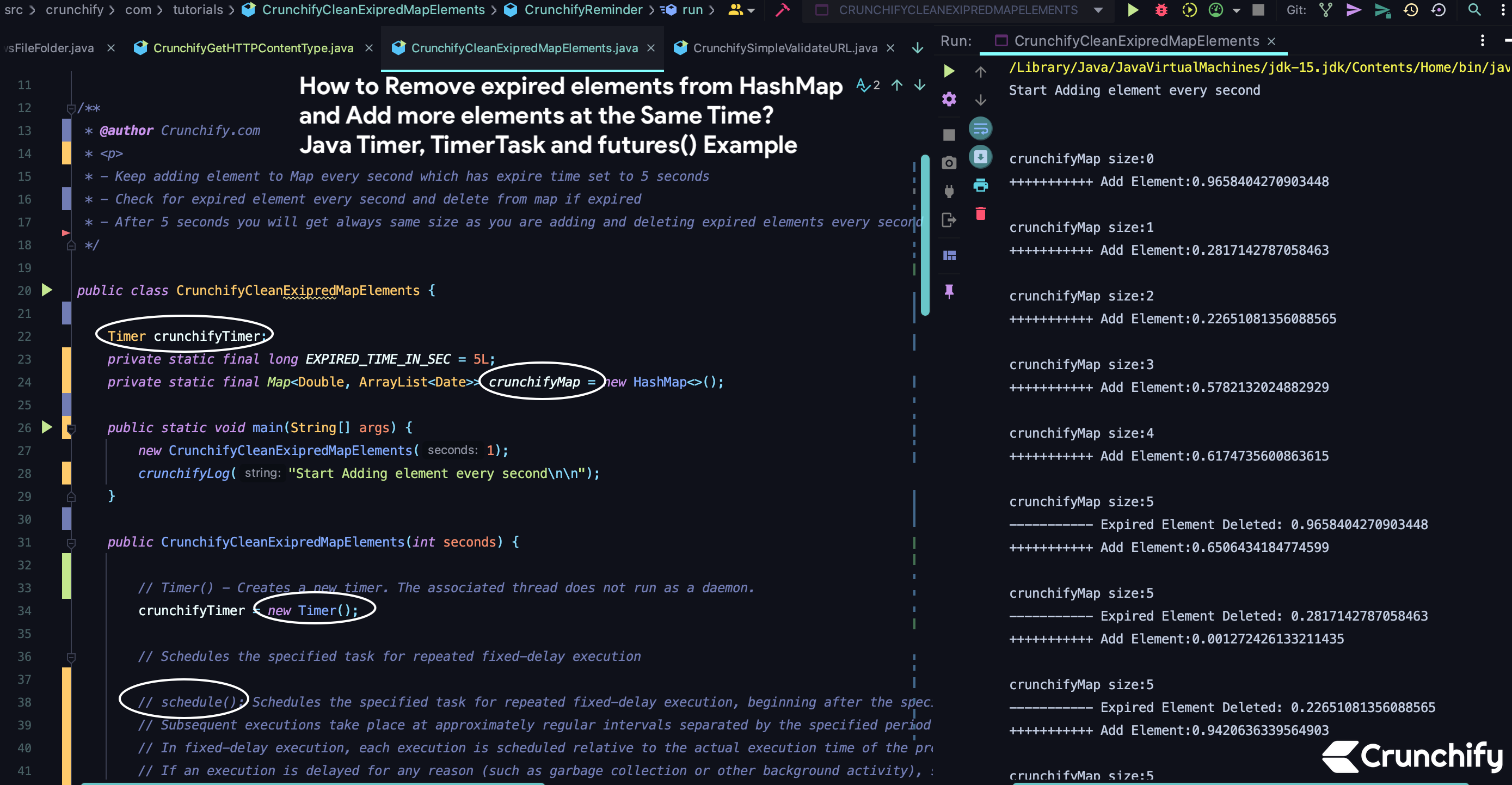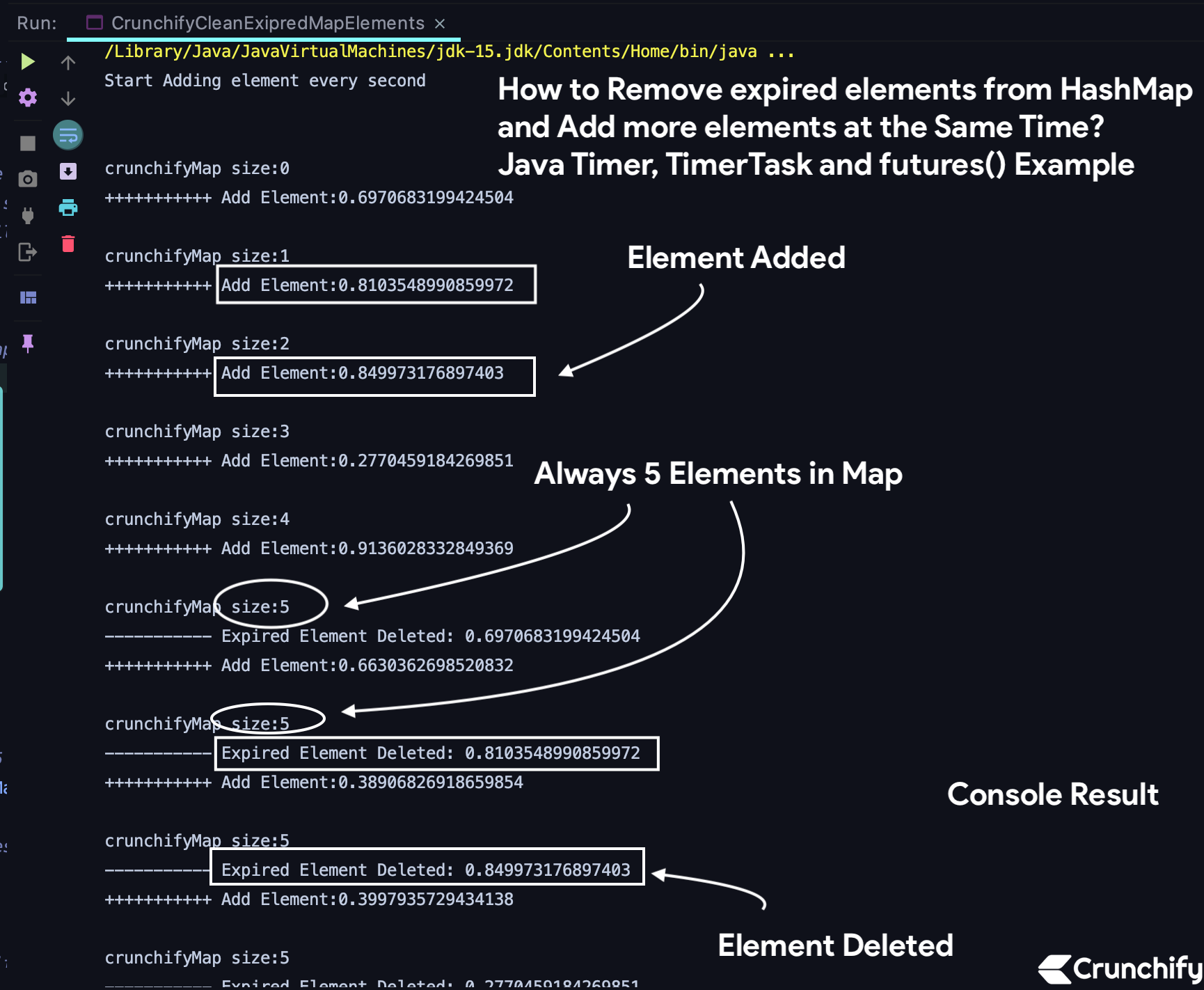HashMap에서 만료된 요소를 제거하고 동시에 더 많은 요소를 추가하는 방법 – Java Timer, TimerTask 및 futures() – 전체 예제
게시 됨: 2021-04-02
Hashmap, ArrayList, Static Map, Vector 등은 가장 많이 사용되는 Java 컬렉션 프레임워크 요소입니다. 필요에 따라 이것을 사용할 수 있는 시나리오가 무한합니다.
이 예제는 매우 흥미로운 Java 예제입니다. 하나의 HashMap()에 대해 아래의 연산을 수행할 것이다.
- crunchifyMap 객체 생성
- 만료 시간이
5 seconds설정된 매초 맵에 요소를 계속 추가합니다. - 매초 캐시와 같은 만료된 요소를
Check하고 만료된delete from map if expired - 5초 후에는 1초마다 만료된 요소를 추가 및 삭제하는
always same size와always 5 elements를 얻게 됩니다.
또한 below questions 이 있는 경우 올바른 위치에 있습니다.
- 수동 만료 맵이란 무엇입니까?
- 시간 초과 요소가 있는 동시 맵
- 자바 캐시 맵 예
- 자바 TimerTask 예제
- Evictor – Java 동시 맵 예제
시작하자:
포인트-1
- 타이머 요소 만들기
crunchifyTimer - 1초인 반복되는 고정 지연 실행을 위해 지정된 작업
CrunchifyReminder()를 예약합니다. - 예약된 작업에서
- crunchifyMap에 요소
add - crunchifyMap에서 만료된 요소를 확인하고 삭제
- crunchifyMap에 요소
포인트-2
-
addElement()작업 중- 각 요소에
current time을 연결하고 있습니다.
- 각 요소에
-
crunchifyClearExipredElementsFromMap()작업 중- 요소의 시간으로 현재 시간을 확인하고 있습니다.
- 시차가 5초 이상이면 crunchifyMap에서 요소를 삭제하십시오.
포인트-3
- Eclipse 콘솔에서 추가 및 제거 작업 인쇄 요소 중
- 첫 번째로 추가된 요소가 첫 번째로 제거되는 식입니다.
- 결과는 Eclipse 콘솔 출력을 확인하십시오.
다음은 자바 프로그램입니다.
|
1 2 3 4 5 6 7 8 9 10 11 12 13 14 15 16 17 18 19 20 21 22 23 24 25 26 27 28 29 30 31 32 33 34 35 36 37 38 39 40 41 42 43 44 45 46 47 48 49 50 51 52 53 54 55 56 57 58 59 60 61 62 63 64 65 66 67 68 69 70 71 72 73 74 75 76 77 78 79 80 81 82 83 84 85 86 87 88 89 90 91 92 93 94 95 96 97 98 99 100 101 102 103 104 105 106 107 108 109 110 111 112 113 114 115 116 117 118 119 120 121 122 |
package crunchify . com . tutorials ; import java . util . ArrayList ; import java . util . Date ; import java . util . HashMap ; import java . util . Iterator ; import java . util . Map ; import java . util . Map . Entry ; import java . util . Timer ; import java . util . TimerTask ; /** * @author Crunchify.com * <p> * - Keep adding element to Map every second which has expire time set to 5 seconds * - Check for expired element every second and delete from map if expired * - After 5 seconds you will get always same size as you are adding and deleting expired elements every second */ public class CrunchifyCleanExipredMapElements { Timer crunchifyTimer ; private static final long EXPIRED_TIME_IN_SEC = 5L ; private static final Map < Double , ArrayList < Date > > crunchifyMap = new HashMap < > ( ) ; public static void main ( String [ ] args ) { new CrunchifyCleanExipredMapElements ( 1 ) ; crunchifyLog ( "Start Adding element every second\n\n" ) ; } public CrunchifyCleanExipredMapElements ( int seconds ) { // Timer() - Creates a new timer. The associated thread does not run as a daemon. crunchifyTimer = new Timer ( ) ; // Schedules the specified task for repeated fixed-delay execution // schedule(): Schedules the specified task for repeated fixed-delay execution, beginning after the specified delay. // Subsequent executions take place at approximately regular intervals separated by the specified period. // In fixed-delay execution, each execution is scheduled relative to the actual execution time of the previous execution. // If an execution is delayed for any reason (such as garbage collection or other background activity), subsequent executions will be delayed as well. // In the long run, the frequency of execution will generally be slightly lower than the reciprocal of the specified period (assuming the system clock underlying Object.wait(long) is accurate). crunchifyTimer . schedule ( new CrunchifyReminder ( ) , 0 , seconds * 1000L ) ; } // TimeTask: A task that can be scheduled for one-time or repeated execution by a Timer. // A timer task is not reusable. Once a task has been scheduled for execution on a Timer or cancelled, // subsequent attempts to schedule it for execution will throw IllegalStateException. class CrunchifyReminder extends TimerTask { public void run ( ) { // We are checking for expired element from map every second crunchifyClearExpiredElementsFromMap ( ) ; // We are adding element every second addElement ( ) ; } } public void addElement ( ) { crunchifyAddElementToMap ( Math . random ( ) ) ; } // Check for element's expired time. If element is > 5 seconds old then remove it private static void crunchifyClearExpiredElementsFromMap ( ) { // Date() - Allocates a Date object and initializes it so that it represents the time at which it was allocated, measured to the nearest millisecond. Date currentTime = new Date ( ) ; Date actualExpiredTime = new Date ( ) ; // if element time stamp and current time stamp difference is 5 second then delete element actualExpiredTime . setTime ( currentTime . getTime ( ) - EXPIRED_TIME_IN_SEC * 1000L ) ; // size() - Returns the number of key-value mappings in this map. If the map contains more than Integer.MAX_VALUE elements, returns Integer.MAX_VALUE. System . out . println ( "crunchifyMap size:" + CrunchifyCleanExipredMapElements . crunchifyMap . size ( ) ) ; Iterator < Entry < Double , ArrayList < Date > > > crunchifyIterator = CrunchifyCleanExipredMapElements . crunchifyMap . entrySet ( ) . iterator ( ) ; // hasNext() - Returns true if the iteration has more elements. (In other words, returns true if next would return an element rather than throwing an exception.) while ( crunchifyIterator . hasNext ( ) ) { // next() - Returns the next element in the iteration. Entry < Double , ArrayList < Date > > entry = crunchifyIterator . next ( ) ; // getValue() - Returns the value corresponding to this entry. // If the mapping has been removed from the backing map (by the iterator's remove operation), the results of this call are undefined. ArrayList < Date > crunchifyElement = entry . getValue ( ) ; while ( crunchifyElement . size ( ) > 0 && crunchifyElement.get(0).compareTo(actualExpiredTime) < 0) { crunchifyLog("----------- Expired Element Deleted: " + entry.getKey()); crunchifyElement . remove ( 0 ) ; } if ( crunchifyElement . size ( ) == 0 ) { // remove() - Removes from the underlying collection the last element returned by this iterator (optional operation). // This method can be called only once per call to next. crunchifyIterator . remove ( ) ; } } } // Adding new element to map with current timestamp private static void crunchifyAddElementToMap ( Double digit ) { ArrayList < Date > crunchifyList = new ArrayList < > ( ) ; CrunchifyCleanExipredMapElements . crunchifyMap . put ( digit , crunchifyList ) ; // add() - Appends the specified element to the end of this list. crunchifyList . add ( new Date ( ) ) ; crunchifyLog ( "+++++++++++ Add Element:" + digit + "\n" ) ; } private static void crunchifyLog ( String string ) { System . out . println ( string ) ; } } |
Eclipse 콘솔 출력:
위의 프로그램을 실행하면 아래와 같은 결과를 볼 수 있습니다.


|
1 2 3 4 5 6 7 8 9 10 11 12 13 14 15 16 17 18 19 20 21 22 23 24 25 26 27 28 29 30 31 32 33 34 35 |
Start Adding element every second crunchifyMap size : 0 +++++++++++ Add Element : 0.6970683199424504 crunchifyMap size : 1 +++++++++++ Add Element : 0.8103548990859972 crunchifyMap size : 2 +++++++++++ Add Element : 0.849973176897403 crunchifyMap size : 3 +++++++++++ Add Element : 0.2770459184269851 crunchifyMap size : 4 +++++++++++ Add Element : 0.9136028332849369 crunchifyMap size : 5 ----------- Expired Element Deleted : 0.6970683199424504 +++++++++++ Add Element : 0.6630362698520832 crunchifyMap size : 5 ----------- Expired Element Deleted : 0.8103548990859972 +++++++++++ Add Element : 0.38906826918659854 crunchifyMap size : 5 ----------- Expired Element Deleted : 0.849973176897403 +++++++++++ Add Element : 0.3997935729434138 crunchifyMap size : 5 ----------- Expired Element Deleted : 0.2770459184269851 +++++++++++ Add Element : 0.20373441843273887 Process finished with exit code 130 ( interrupted by signal 2 : SIGINT ) |
Java 프로그램을 실행하는 데 문제가 있으면 알려주십시오.
